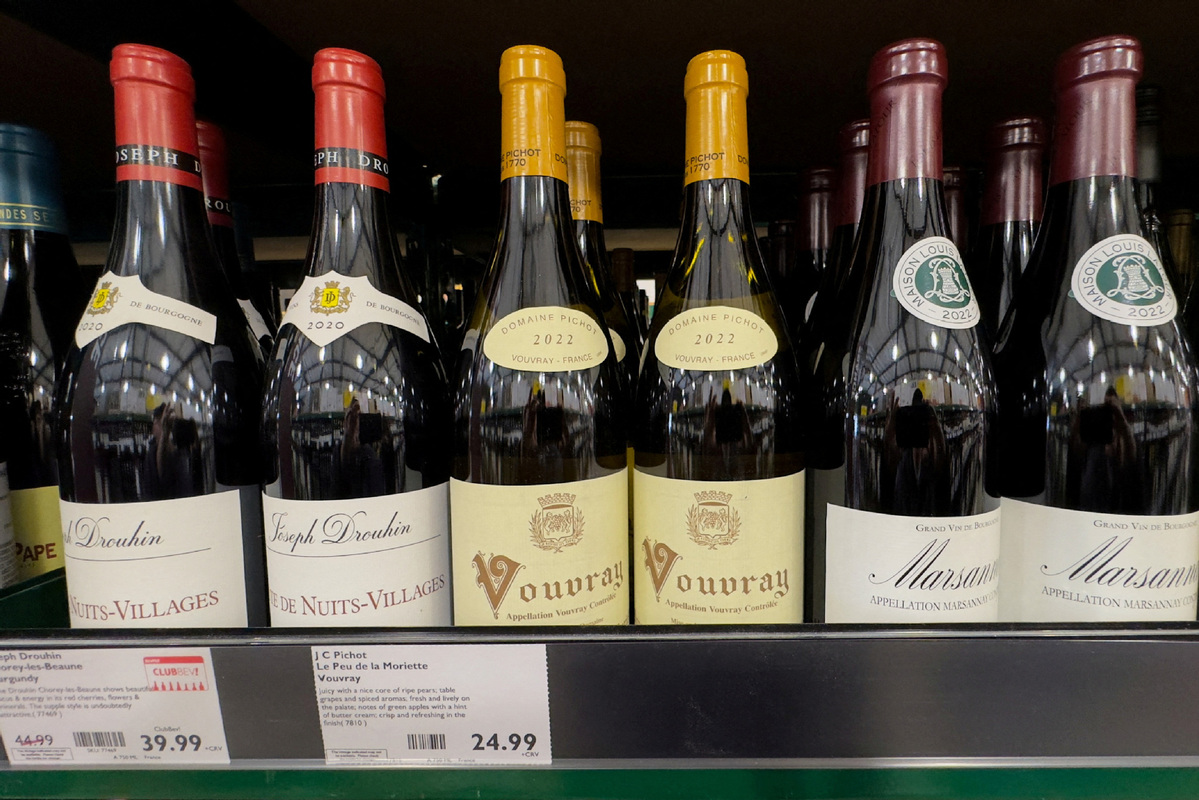
French wine is shown for sale on the shelves of a wine store in Encinitas, California, US, March 13, 2025. [Photo/Agencies]
French businesses are bracing for economic disruption after the United States announced a 25-percent tariff on some of the nation's key exports, including wine, cognac, and luxury items.
The move has sparked concern across France's signature wine and spirits industry, which plays a vital role in both national identity and international trade.
The tariffs, which were authorized by US President Donald Trump on Wednesday, are being widely viewed as in retaliation for France's digital services tax, which targets large technology companies — many of which are American. The duties are expected to take effect within 10 days.
In response, France's President Emmanuel Macron convened an emergency meeting at the Elysee Palace in Paris on Thursday with leaders from the wine, spirits, and agricultural sectors.
According to Macron's office, the discussion focused on the risks posed by the tariffs and on preparing a coordinated national and European response.
The US is the second-largest market for French wine and spirits. Industry groups warn that export volumes could drop by up to 20 percent if the tariffs are sustained.
"We're facing a perfect storm," said Jacques Lemoine, head of a Bordeaux wine exporters' association, in an interview with Le Figaro.
Constructive meeting
Macron has emphasized, however, that France is not facing the crisis alone and a statement released by his office described Thursday's meeting as "constructive", and confirmed that France is working with European Union partners on a joint response, potentially involving a case they will take to the World Trade Organization, or WTO.
Minister of Economy and Finance Eric Lombard, speaking on RMC and BFMTV on Friday, said the government is considering emergency support measures, including targeted financial aid, tax relief, and export insurance.
"We still hope to reach an agreement," Lombard said. "But we're also preparing for a prolonged dispute. If we must choose between budget discipline and defending our producers, we'll choose our producers."
He added that the broader economic impact could weigh on France's 2025 growth targets.
"We could still see growth, but more modest. And yes, the public deficit may rise," he said.
Patrick Martin, president of the Movement of the Enterprises of France, or MEDEF, the largest employers' federation in France, called for urgent, coordinated action.
"This affects over 1.5 percent of our GDP and many thousands of jobs," he said in an interview with La Chaine Info, a French free-to-air news channel.
Minister for Industry and Energy Marc Ferracci has announced a new National Industry Council will convene on Tuesday to assess the fallout from the tariffs and formulate response strategies.
During a visit to an Airbus facility near Toulouse, he said: "We are in uncharted territory. We need to listen to the concerns of businesses and take immediate steps to contain the damage."
Laurent Saint-Martin, France's foreign trade minister struck a defiant tone, telling BFM Business: "If we don't respond strongly, we send the wrong signal. Only a collective European position can shield us from economic coercion."
Former industry minister Roland Lescure said the time is right for France to shift its trade priorities.
"We should fast-track CETA," he said, referring to the EU-Canada trade agreement.
Geopolitical undercurrents
Historians and analysts suggest the tariffs dispute is part of a broader reconfiguration of transatlantic relations.
"In Washington's worldview, Europe is often seen as the past —important, but declining," said historian Jean-Francois Colosimo.
Despite rising tensions, economic ties remain strong. In 2023, France was the fifth-largest foreign investor in the US, with more than $370 billion in assets. The US, in turn, remains France's top foreign investor, holding more than 140 billion euros ($153 billion) in French assets, according to the Banque de France.
Pascal Lamy, a former director-general of the WTO, sees Trump's tariffs as both a test and an opportunity.
Speaking with Les Echos, he said: "This is a challenge, yes — but also a chance for Europe to lead. While the US turns inward, we can be a voice for stability and open markets."
EU trade officials are scheduled to meet soon to discuss a collective strategy. In the meantime, French producers are in a holding pattern — hoping for a diplomatic breakthrough but preparing for prolonged disruption.
For now, one of France's proudest industries is navigating deep uncertainty, caught in the crosshairs of an escalating trade dispute with its oldest ally.
The writer is a freelance journalist for China Daily.